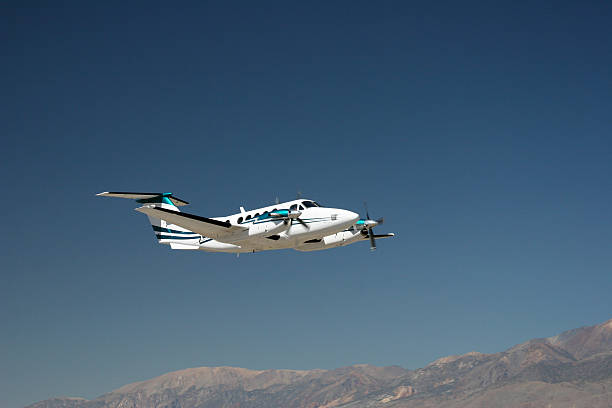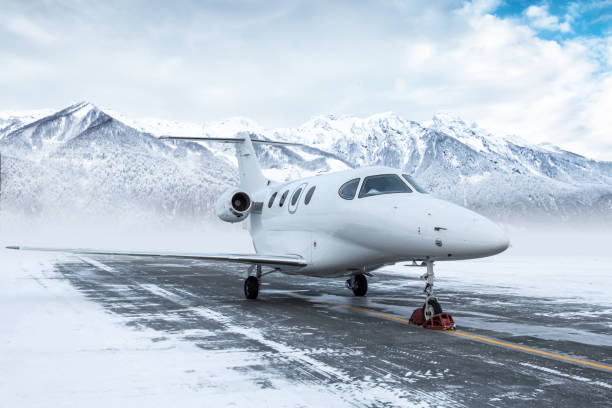Denver Private Jet Travel: Fast Access to the Rockies

In today's fast-paced business environment, efficiency isn't just an advantage—it's a necessity. For corporate executives and business leaders seeking rapid access to Colorado's thriving markets and world-renowned mountain destinations, private jet travel through Denver represents the ultimate fusion of business necessity and lifestyle enhancement. Denver is exactly one mile (5,280 ft.) above sea level, earning its nickname as the "Mile High City," and serves as the perfect launching point for both high-stakes business meetings and premium leisure experiences in the American West.
Strategic Gateway to the Mountains
Denver's position as a premier private aviation hub stems from its unique geographical advantages and robust infrastructure. Denver enjoys at least 300 sunny days every year, providing optimal flying conditions for private jet operations throughout most of the year. The city's elevation and location create ideal weather patterns that minimize weather-related delays, a critical factor for time-sensitive business travel.
The Denver metropolitan area offers three primary airports specifically catering to private jet operations, each strategically positioned to serve different business and leisure needs. The major airports for private travel to Denver include the Centennial Airport (APA), Jefferson County Airport (BJC), and Denver International Airport (DEN). This diversity ensures that private jet travelers can select the most convenient departure and arrival points based on their final destinations and specific requirements.
Centennial Airport (APA): The Business Aviation Hub
Centennial Airport is Denver's most popular private jet hub, and one of the top general aviation hubs in the United States, offering round-the-clock customs services and averaging between 850-900 operations per day with more than 850 aircraft based on-site. Located approximately 13 miles from downtown Denver, Centennial Airport serves as the gateway to Colorado's business district while maintaining easy access to mountain destinations.
The airport's strategic location within the Denver Tech Center provides immediate access to 23 separate business parks, making it the preferred choice for corporate travelers. Centennial is the third busiest general aviation airport in the United States, reflecting its importance in the national private aviation network.
Jefferson County Airport (BJC): Closest to Downtown
For executives requiring the shortest ground transportation times, Jefferson County Airport is located just 15 miles from downtown Denver, making it the closest private jet facility to the city's central business district. BJC offers three runways, the longest of which measures 9,000 feet, accommodating various aircraft from light private jets to large corporate planes.
The airport's proximity to Boulder also makes it attractive for technology sector professionals, as BJC is only 14 miles from Boulder, making it the perfect gateway for visitors heading to the University of Colorado, tech hubs, and outdoor recreational hotspots.
The Business Case for Denver Private Aviation
Economic Impact and Market Growth
Colorado's aviation industry represents a significant economic force, with airports collectively generating $68.9 billion in annual business revenue, supporting 348,500 jobs with a total payroll of $23.5 billion. This robust economic foundation reflects the state's commitment to maintaining world-class aviation infrastructure.
The private jet market has shown remarkable resilience and growth. The global business jet market exceeded $24 billion in value in 2020, with projections indicating it's expected to approach $37 billion by 2028. This growth trajectory demonstrates the increasing recognition of private aviation as an essential business tool rather than a luxury amenity.
Time Efficiency: The Ultimate ROI
The time savings achieved through private jet travel to Denver create measurable business value. Commercial aviation requires arriving hours before departure, navigating security checkpoints, and adhering to rigid schedules that often don't align with business needs. Private jet travel eliminates these inefficiencies, allowing executives to maximize productive time.
Flying from Denver to Miami takes approximately 3 hours and 42 minutes, demonstrating the rapid connectivity private aviation provides between major business centers. This efficiency becomes even more pronounced when accessing mountain destinations that would otherwise require additional ground transportation from commercial airports.
ParaFlight's Expert-Driven Concierge Model
Speed and Last-Minute Capabilities
ParaFlight's core value proposition centers on unprecedented speed and flexibility in private jet charter services. Our expert-driven model enables same-day and last-minute charter arrangements that traditional aviation services cannot match. Private jet charters can be arranged with as little as 3-6 hours notice from the time of booking to takeoff, ensuring that urgent business opportunities never wait for transportation logistics.
This rapid response capability stems from our comprehensive network of pre-positioned aircraft and strategic relationships with operators throughout the Denver market. Our concierge approach means that every charter request receives personalized attention from aviation professionals who understand both the technical requirements of flight operations and the sophisticated needs of executive travelers.
Exclusive FAA Part 135 Certified Operations
ParaFlight partners exclusively with FAA Part 135 certified operators, ensuring the highest standards of safety and professionalism. FAA Part 135 is a certificate required by the Federal Aviation Administration for a company to operate as a non-scheduled air charter carrier, designed to set boundaries and establish safety procedures.
The Part 135 certification process represents the gold standard in commercial aviation safety. Part 135 establishes stringent pilot qualification requirements including minimum flight hours of 1,200 total hours, 500 hours cross-country time, 100 hours night flight time, instrument ratings, and recurrent training every 12 months. These requirements far exceed those for private aircraft operations, providing our clients with professional crew standards that match the most demanding business environments.
According to the National Transportation Safety Board (NTSB), commercial aviation under Part 135 has a substantially lower accident rate than general aviation, with comprehensive training requirements, maintenance standards, and operational procedures creating multiple layers of safety protection.
Colorado Mountain Destination Access
Premier Ski Destinations
Denver's position as a private jet gateway transforms access to Colorado's world-renowned ski destinations. Colorado Springs provides easy access to several ski resorts such as Arapahoe Basin Ski Area, Keystone Ski Resort, Loveland Ski Area, and Winter Park Resort. Private jet travelers can depart major business centers in the morning and be on the slopes the same afternoon, maximizing both business productivity and leisure time.
The integration of business and lifestyle travel represents a growing trend in corporate aviation. Bleisure trips have a worldwide market value of nearly $600 billion, with 76% of business travelers planning to take a bleisure trip in the next 12 months. Denver's unique position allows executives to seamlessly combine business meetings with premium recreational activities.
Mountain Business Centers
Beyond recreational destinations, Colorado's mountain communities host significant business activity. Towns like Aspen, Vail, and Telluride regularly host corporate retreats, industry conferences, and executive meetings that require rapid, reliable transportation. Private jet access eliminates the complexity of commercial connections and mountain driving conditions that can impact business schedules.
BJC's proximity to the Colorado Mountains makes it ideal for travelers seeking world-class skiing, hiking, and outdoor adventures, while maintaining the infrastructure necessary for serious business operations.
Aircraft Selection for Denver Operations
Optimal Aircraft Categories
The elevation and runway characteristics of Denver-area airports accommodate a full spectrum of private aircraft. Commonly utilized private jets in the area include light jets (Hawker 800 XP, Learjet 35, Citation CJ3, and Citation Bravo), super light jets (Falcon 10, Learjet 45, and Citation Excel), midsize jets (Learjet 60, Hawker 800XP, and Gulfstream 150), super midsize jets (Hawker 1000, Citation Sovereign, and Falcon 50), and large jets (Challenger 604, Falcon 2000, and Falcon 2000LX).
Performance Considerations
Denver's elevation requires careful consideration of aircraft performance capabilities. The "thin air" at 5,280 feet affects both takeoff performance and passenger comfort for those unaccustomed to altitude. ParaFlight's expert team provides guidance on optimal aircraft selection based on passenger count, destination requirements, and altitude considerations.
For transcontinental flights departing Denver, most private jets can make flights from Denver to Miami nonstop, though this may be subject to aircraft model and current weather conditions. This nonstop capability enables efficient coast-to-coast business travel without the delays associated with fuel stops.
Market Trends and Future Growth
Post-Pandemic Aviation Landscape
The private aviation industry has demonstrated remarkable resilience and growth following the COVID-19 pandemic. After private aviation came to almost a dead stop during Covid, when things resumed, companies with flight departments started traveling privately, eventually seeing record-setting years for general and business aviation in metro Denver.
This growth reflects a fundamental shift in how corporations view private aviation—not as an extravagance, but as an essential tool for maintaining business continuity and executive productivity.
Colorado's Growing Corporate Landscape
Denver has experienced tremendous growth with many corporate entities moving to the area, creating demand for hangar space and office facilities at high-water levels. This corporate migration to Colorado creates sustained demand for private aviation services, as relocated companies maintain business relationships and operations across multiple geographic markets.
The state's economic diversification into technology, aerospace, and renewable energy sectors creates sophisticated air transportation requirements that traditional commercial aviation cannot efficiently serve.
Operational Excellence and Safety Standards
Maintenance and Regulatory Compliance
ParaFlight's commitment to safety extends beyond pilot qualifications to encompass comprehensive maintenance standards. Aircraft operated on a Part 135 certificate must comply with manufacturer recommended Time Between Overhauls (TBOs), maintain complete maintenance records with no gaps in documentation, and any time or cycle limited components with incomplete maintenance records must be brought back to zero time status.
These stringent maintenance requirements ensure that every aircraft in our network operates at peak performance and safety levels, providing the reliability that business operations demand.
Weather and Operational Considerations
Denver's geographic and climatic conditions create specific operational advantages for private aviation. Denver offers stunning mountain views and at least 300 sunny days every year, providing excellent visibility and favorable flying conditions for the majority of the operational year.
Professional flight operations teams continuously monitor weather patterns and maintain alternative routing options to ensure schedule reliability even during adverse conditions.
The Economic Value Proposition
Cost Efficiency Analysis
While private jet charter represents a premium service, the total cost of ownership analysis often reveals significant value when accounting for executive time savings, schedule flexibility, and productivity gains. Business travelers typically spend around $1,018 per trip on traditional business travel, but this figure doesn't account for the indirect costs of schedule disruptions, missed connections, and unproductive travel time.
Private jet charter eliminates these hidden costs while providing quantifiable time savings that translate directly to business value.
Market Positioning
Corporate travel is predicted to generate $1.48 trillion in spending in 2024, with the business travel market expected to hit $829.5 billion by 2027. These projections reflect the fundamental importance of business travel in the modern economy and the growing recognition that efficient transportation directly impacts business success.
Conclusion: Redefining Business Travel Standards
Private jet travel through Denver represents more than transportation—it embodies a strategic approach to business efficiency and lifestyle integration. The combination of Colorado's geographic advantages, robust aviation infrastructure, and growing corporate landscape creates an ideal environment for private aviation operations.
ParaFlight's expert-driven, concierge model transforms the private jet charter experience from a complex logistical challenge into a seamless business tool. Our exclusive partnerships with FAA Part 135 certified operators ensure that safety and professionalism never compromise speed and flexibility.
The Colorado mountain region's unique blend of business opportunities and premium lifestyle destinations makes private jet travel through Denver an investment in both productivity and quality of life. As corporate America increasingly recognizes the value of efficient, flexible transportation, private aviation through Denver will continue to serve as the preferred solution for discerning executives who refuse to compromise on either time or experience.
For business leaders seeking rapid access to Colorado's dynamic markets and world-class mountain destinations, ParaFlight delivers the speed, safety, and sophisticated service that modern business demands. The future of executive travel isn't just about reaching your destination—it's about arriving ready to succeed.
References
- Private Aviation Industry Information. "Colorado Aviation Market Analysis." Available at: https://www.businessairportinternational.com/features/an-overview-of-the-business-aviation-options-in-colorful-colorado.html
- Colorado Aviation Economic Impact Study. "Economic Impact of Colorado Airports." Available at: https://www.coloradoairports.org/news/colorado-airports-contribute-68-9-billion-annually-to-states-economy/
- Federal Aviation Administration. "FAA Part 135 Certification Requirements." Available at: https://www.faa.gov/licenses_certificates/airline_certification/135_certification
- Business Travel Statistics and Trends. "Corporate Travel Market Analysis." Available at: https://www.travelperk.com/blog/business-travel-statistics/
- National Transportation Safety Board. "Aviation Safety Statistics." Available at: https://www.ntsb.gov/safety/safety-studies/Pages/default.aspx















